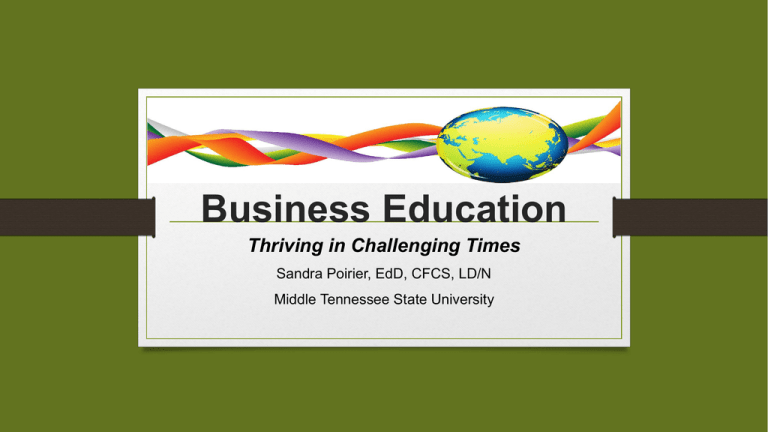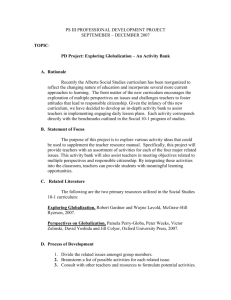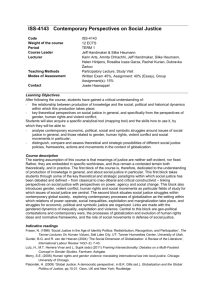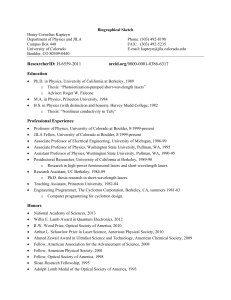Thriving in Challenging Times - The International Society for
advertisement

Business Education Thriving in Challenging Times Sandra Poirier, EdD, CFCS, LD/N Middle Tennessee State University Agenda • What are some of the challenges in creating a sustainable workforce? • What are the key components of a 21st Century Learning Environment? • New sustainable initiatives on the horizon for business Education for Business Sustainability sustainable solutions through business education What are some Global Challenges in Creating a Sustainable Workforce? Our Changing World "There is nothing wrong with change, if it is in the right direction." Winston Churchill Constant change. Never changes. “ A new era of production has begun. Its principles of organization are as different from those of the industrial era as those of the industrial era were different from the agricultural. The cybernation revolution has been brought about by the combination of the computer and the automated self-regulating machine. This results in a system of almost unlimited productive capacity which requires progressively less human labor. Cybernation is already reorganizing the economic and social system to meet its own needs. The Ad Hoc Committee on The Triple Revolution, “The Triple Revolution,” April 6, 1964. ” Computers have changed the jobs that are available, the skills those jobs require, and the wages the jobs pay. Skills Gap Current Education Systems are facing Unprecedented Challenges • Globalization and Learning • Technological Change Demands More and Different Skills Globalization and Learning • • • • The Need for a New Curriculum Demographic Changes is Driving a Renewed Need for Lifelong Learning An Endless Demand for New Forms of Learning A Pressing Need for Action Global INTERNET Use by Region Africa 9.8% Europe 19% Asia 48.2 % Americas 21.8% Asia Americas Europe Africa Oceania Source: Internet Live Stats (elaboration of data by International Telecommunication Union (ITU) and United Nations Population Division Trends that have changed the demands of work and life • • • • Automation Globalization Workplace Change Policies Increasing Personal Responsibility Five Broad Types of Workplace Tasks • • • • • Solving Unstructured Problems Working with New Information Routine Cognitive Tasks Routine Manual Tasks Non-Routine Manual Tasks Job Tasks Are Changing Across the Economy New Division of Labor The jobs growing in number share two general skills that computers cannot replicate—expert thinking and complex communication. 11 Robots Education for Business Sustainability sustainable solutions through business education What are the Key Components of a 21St Century Education? The World of Today for Our Students A Science and Knowledge Economy A Resource Challenged Economy An Innovation Driven Economy STUDENTS A Demographically Diverse Economy A Globally Interdependent Economy INNOVATION • What is desirable to users? • What is possible with technology • What is viable in the marketplace INNOVATION Effective teachers Quality curriculum STUDENTS Integrated wraparound support Engaged families Personalized learning Education for Business Sustainability sustainable solutions through business education New Sustainable Initiatives on the Horizon for Business Education The Developing Redefinition of Higher Education Should Provide Benefits that will Continue for Decades into the Future • We will have to adapt as information technology advances. • Continually re-evaluate what is inherently different between human and computer learning, and what is practical and useful to students for the long haul. • And we will have to face the reality that the “art of living in the world” requires at least some elements of a business education. Jobs of the Future.com • Preparing for College and Career • Earning Post Secondary Credentials • Advancing Careers and Economic Growth LEARNING THAT WORKS FOR YOUR FUTURE http://www.uschamberfoundation.org/talent-pipeline-management Career Pathways What is Global Competence? • Knowledge of other world regions, cultures, and global/international issues • Skills in communicating in languages other than English, working in global or cross-cultural environments, and using information from different sources around the world • Values/perspectives of respect and concern for other cultures and peoples Why Global Competence? • Globalization is driving the demand for a globally competent workforce • One in five jobs is tied to international trade • Business growth will be in overseas markets Global Competencies: 21st Century Skills Applied to the World • Identify an issue, generate questions, and explain its significance. • Use variety of languages, sources and media to identify and weigh relevant evidence. • Analyze, integrate, and synthesize evidence to construct coherent responses. • Develop argument based on compelling evidence and draws defensible conclusions. Investigate the World Recognize Perspectives Students investigate the world beyond their immediate environment. Students recognize their own and others’ perspectives. • Recognize and express their own perspective and identify influences on that perspective. • Examine others’ perspectives and identify what influenced them. • Explain the impact of cultural interactions. • Articulate how differential access to knowledge, technology, and resources affects quality of life and perspectives. Understand the World through Disciplinary and Interdisciplinary Study Take Action • Identify and create opportunities for personal or collaborative action to improve conditions. • Assess options and plan actions based on evidence and potential for impact. • Act, personally or collaboratively, in creative and ethical ways to contribute to improvement, and assess impact of actions taken. • Reflect on capacity to advocate for and contribute to improvement. Students translate their ideas into appropriate actions to improve conditions. Communicate Ideas Students communicate their ideas effectively with diverse audiences. • Recognize and express how diverse audiences perceive meaning and how that affects communication. • Listen to and communicate effectively with diverse people. • Select and use appropriate technology and media to communicate with diverse audiences. • Reflect on how effective communication affects understanding and collaboration in an interdependent world. West, C. (2012). Toward Globally Competenent Pedagogy. Washington, DC: Association of International Education. Apprenticeships are the Path to a Global Economy Key Elements of Modern Quality Apprenticeship Systems • Social Dialogue • Roles and Responsibilities • Financing • Legislation Certifications for Ed-Tech Professionals Promote Lifelong Learning http://www.leadingedgecertification.org/ NanoDegrees by Google • • • • Stand out with tech skills that matter. Learn by doing projects employers value. Study smart without leaving your current job. https://www.udacity.com/nanodegree Udacity’s Nanodegree Program Front-End Web Developer Android Developer Data Analyst iSO Developer Full-Stack Developer Introduction to Programming “ ...most individuals will need to acquire new knowledge and skills over their work lives in order to earn a good living in a changing work world. Dancing with Robots: Human Skills for Computerized Work by Frank Levy and Richard J. Murnane Lifelong Learning ” Countries are working together to retool and retrain their citizens for work and life changes in the future. Online and hybrid courses are very popular. http://www.m-house.eu/ Education should achieve changes in the community which: Goals of Sustainable Development in Business Education •Lead to changes in work, lifestyle and consumption patterns . •Encourage people to consider alternatives. •Enable people to take part in decision making. •Enable people to find information. •Give people opportunities to participate. •Encourage principles leading to a fairer society. •Help people to understand the links between issues Sustainable Education Should Help Students Towards the Following Objectives: Knowledge Values Skills How natural processes work A commitment to all living things Co-operative working How our lives connect with others A desire for social justice Empathy and awareness Critical thinking Negotiation The planet earth as a finite resource Understanding of quality of life Rights and responsibilities Reasoned debate Problem solving How to make decisions How we provide for human needs A global perspective and loyalty to the world community Creative ability Research & data handling Communication skills Dr. Sandra Poirier, Professor Middle Tennessee State University Tennessee, USA References • • WorldSkills. (2014). Global Standards: Bridging the Skills Gap. London: North Warwickshire and Hickley College. • Axmann, M. (2013, June 3). International Labor Organization . Retrieved from Apprenticeships Systems -what do we know?: http://www.ilo.org/beirut/media-centre/fs/WCMS_214722/lang--en/index.htm • Carnevale, A. P., Rose, S. J., & Hanson, A. R. (2012). Certificates: Gateway to Gainful Employment and College Degrees. Washington, D.C.: Georgetown Uiversity, Center on Education and the Workforce. • Levy, F., & Murnane, R. J. (2004). The New Division of Labor: How Computers are Creating the New Job Market. Princeton: Princeton University Press. • Murnane, R. J., & Levy, F. (2013, March 20). Dancing with Robots: Human Skills for Computerized Work. Retrieved from Third Way Fresh Thinking: http://content.thirdway.org/publications/714/Dancing-With-Robots.pdf • School, H. B. (2011). Lasting Impact: A Business Leaders's Playbook for Supporting America's Schools. Hartford : Bill and Melinda Gates Foundation. Austin, J. T. (2012). Portable, Stackable Credentials: A New Education Model for Industry-specific Career Pathways. New York: McGraw-Hill Research Foundation.




